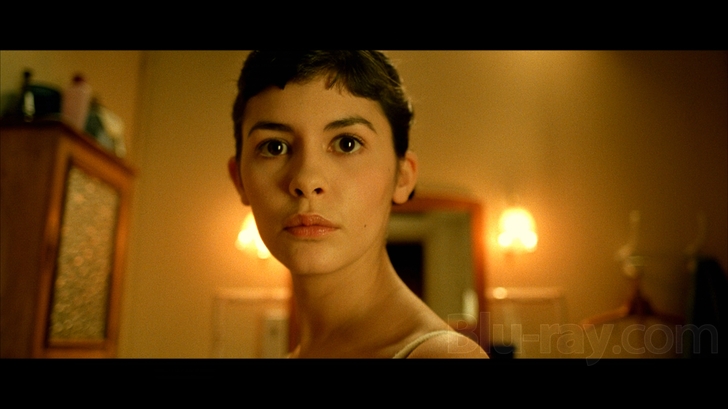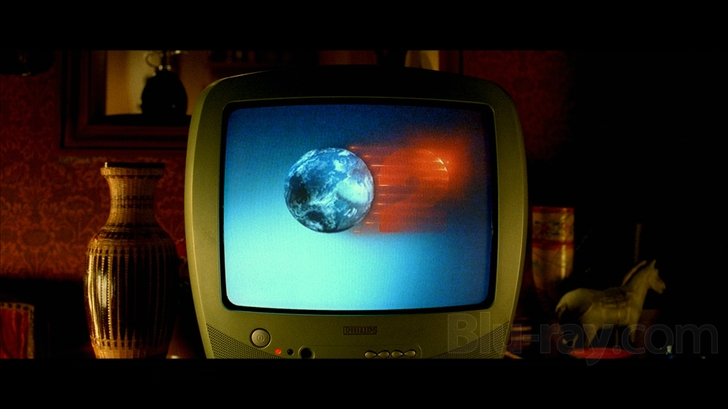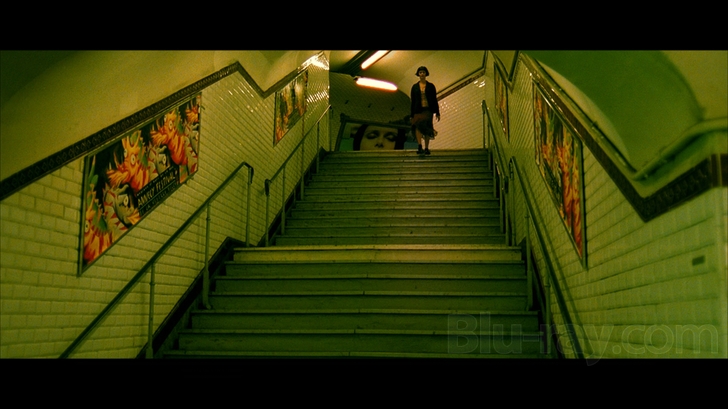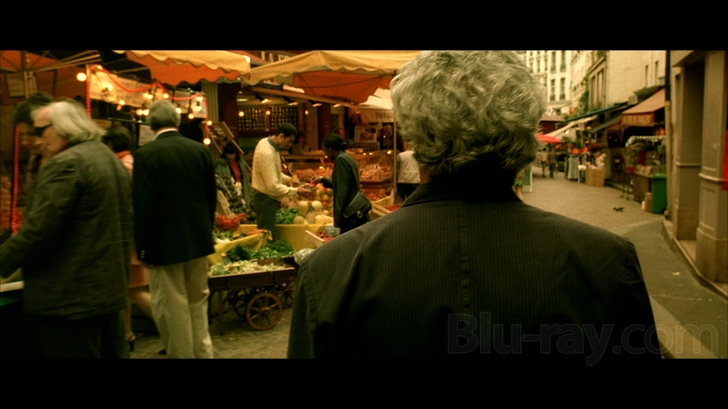Amélie Blu-ray Movie
HomeAmélie Blu-ray Movie 
Le Fabuleux destin d'Amélie PoulainLionsgate Films | 2001 | 122 min | Rated R | Jul 19, 2011

Movie rating
8.4 | / 10 |
Blu-ray rating
| Users | 3.9 | |
| Reviewer | 4.5 | |
| Overall | 4.0 |
Overview
Amélie (2001)
Bursting with imagination and having seen her share of tragedy and fantasy, Amélie is not like the other girls. When she grows up she becomes a waitress in a Montmartre bar run by a former dancer. Amelie enjoys simple pleasures until she discovers that her goal in life is to help others. To that end, she invents all sorts of tricks that allow her to intervene incognito into other people's lives, including an imbibing concierge and her hypochondriac neighbor. But Amélie's most difficult case turns out to be Nino Quicampoix, a lonely sex shop employee who collects photos abandoned at coin-operated photobooths.
Starring: Audrey Tautou, Mathieu Kassovitz, Rufus, Yolande Moreau, Artus de PenguernNarrator: André Dussollier
Director: Jean-Pierre Jeunet
| Drama | Uncertain |
| Romance | Uncertain |
| Foreign | Uncertain |
| Surreal | Uncertain |
| Comedy | Uncertain |
Specifications
Video
Video codec: MPEG-4 AVC
Video resolution: 1080p
Aspect ratio: 2.35:1
Original aspect ratio: 2.39:1
Audio
French: DTS-HD Master Audio 5.1 (48kHz, 24-bit)
Subtitles
English, English SDH, Spanish
Discs
50GB Blu-ray Disc
Single disc (1 BD)
Playback
Region A (locked)
Review
Rating summary
| Movie | 4.5 | |
| Video | 4.5 | |
| Audio | 4.5 | |
| Extras | 3.0 | |
| Overall | 4.5 |
Amélie Blu-ray Movie Review
A fabulous destiny indeed.
Reviewed by Jeffrey Kauffman July 15, 2011One of my favorite all-time commentary moments was provided by the ever colorful Ron Perlman on his commentary track for the decidedly odd film City of Lost Children, one of a number of wonderful collaborations by Marc Caro and Jean-Pierre Jeunet. Perlman starts his commentary on the film out by saying something along the lines of, “This is the extremely peculiar opening of City of Lost Children. . .which is followed by the extremely peculiar middle section and then the extremely peculiar ending.” As off the cuff hilarious as that comment is, it in its own way aptly sums up the really unique world of Caro-Jeunet films, films which include such disparate fare as the cult hit Delicatessen and the multiplex sensation Alien Resurrection (actually solely directed by Jeunet, but featuring some production design help from Caro). Jeunet’s very distinctive flair for both story and directorial ebullience is also fully on display in the incredibly charming, and just as incredible odd, Amélie, a film which rather unexpectedly became an international attraction of rather gigantic proportions, ultimately garnering five Academy Award nominations. As with most Jeunet (or Jeunet-Caro) films, Amélie is a completely quirky outing that combines a completely inventive and captivating production design with a decidedly anti-Hollywood approach to a standard three act, overly structured storyline. Like its breakout star Audrey Tatou, Amélie is full of charm and a sort of innocent sex appeal, idiosyncratic and singularly eccentric and even more than a little bit odd at times.

Jeunet’s abject refusal to follow accepted filmic norms is evident right off the bat with Amélie. We’re given a number of brief snippets of events happening at the same time, seemingly without any real connection to each other save for their simultaneity, one of which includes the conception of Amelie herself. A timelapse montage of Amélie’s mother’s growing pregnant belly leads to a brief scene of Amélie being born, and we get the title sequence (and it’s instructive to note that the original French title of the film is the perhaps more descriptive The Fabulous Destiny of Amélie Poulain). And then, for virtually the next fifteen minutes, we are greeted with a narrated sequence which gives us Amelie’s background while also introducing us to a number of other supporting characters. This opening gambit is odd in and of itself, but its most fascinating characteristic is that despite being narrated, we don’t feel especially removed from Amélie or indeed the many other characters introduced in this sequence. We’re thrust headlong into the weird and wonderful world of Amélie, a girl who by fate or circumstance is isolated from the world and especially from other children and who learns to exist within the rather spacious confines of her imagination.
And then, about three quarters of the way through this opening narrated segment, a bizarre, seemingly random, event occurs (and seemingly random events are sprinkled into Amélie like fine garnishes offered at the best French restaurants). Amélie, now a young woman working as a waitress at a Montmartre café, is getting ready for bed in the evening in her bathroom when she overhears a news report on the television in the other room announcing the death of Princess Diana. In shock, Amélie drops a bottle cap which rolls and loosens a baseboard tile. Curious, Amélie crawls over and pulls the tile away, revealing a treasure box secreted some 40 years previously by a little boy who had lived in the same apartment. Within a short span of time, she resolves to find the boy (now obviously a middle-aged man) who had put the box there and to return it to him. If he responds well to the reuniting, she’ll dedicate her life to good deeds. If he doesn’t, she’ll chalk the whole event up to the vagaries of chance and go on her semi-merry way.
To say more about the meandering plot of Amélie, a plot which twists and turns like one of the zig-zagging alleyways of Montmartre itself, would be unfair to anyone who hasn’t yet come under the spell of this singular and very unique film. Suffice it to say that Jeunet consistently defies expectations while never completely scuttling an emotional resonance that makes the character of Amélie easily understandable and more than anything incredibly sympathetic. Amélie is a film with an almost overwhelming amount of heart, but it’s never treacly and instead tends toward a sort of arch humor, albeit one never laced with cynicism or irony.
The term gamine seems destined to be preternaturally linked to women named Audrey. For a prior generation, Audrey Hepburn was the ultimate gamine, but it may turn out that Audrey Tatou eclipses Hepburn herself in terms of the doe-eyed innocence and sweetly vulnerable naďvete most often associated with the term. Though Amélie was evidently originally written with Emily Watson in mind for its title role, it was an incredible stroke of luck that Tatou ended up in the role, for rarely if ever have an actress and a role been so perfectly married. Tatou’s unbelievably expressive face and her almost mime-like ability to depict emotional states with little or no dialogue helps to create the very real sense of magic which imbues Amelie with much of its luster.
Amélie is easily one of the downright sweetest films to come down the pike over the past several years, but the wonderful news is that it manages to maintain its own sense of the fantastic at virtually every turn without ever seeming overly fake. Jeunet’s inerrant sense of hyperrealism merged with surrealism and just out right magical realism makes Amelie a completely idiosyncratic experience that is literally incomparable. It may in the inimitable words of Ron Perlman be “extremely peculiar,” but it’s the sort of absolutely original concoction that is too often lacking in the modern world of cinema.
Amélie Blu-ray Movie, Video Quality 

Amélie is one of the most gorgeous films in recent memory, and the good news is this new AVC encoded 1080p transfer in 2.35:1 finally reproduces the film's absolutely lush and luscious cinematography largely to a tee. Cinematographer Bruno Delbonnel received a well-deserved Academy Award nomination for his sun drenched work here, a series of images which is absolutely bathed in golden tones that are somehow utterly redolent of the French soul. The image here is beautifully sharp and extremely well detailed. For example, on the SD-DVD I had frankly never even noticed the small stream of water flowing in the lower left side of the screen in the film's opening shot detailing the life of the blue fly. But over and over again fine detail is staggering in this release, and the brilliant palette is both robust and wonderfully well saturated. Digital post was still a relatively new phenomenon when this film was released and then migrated to DVD, and Jeunet goes into some detail in the commentary about how various scenes were digitally pushed toward the green end of the spectrum for example, but this Blu-ray offers all of that artificiality with really nuanced detail. Amélie has had a somewhat spotty release history on some international Blu-rays, but Lionsgate has done a stellar job on this first domestic release.
Amélie Blu-ray Movie, Audio Quality 

Amélie is presented with only its original French language track, offered here in lossless DTS-HD Master Audio 5.1, but that's nothing to sneeze at. This is a wonderfully realized and brilliantly reproduced track that is both boisterous and very subtle at times. Surround activity is fairly consistent, especially in the use of ambient noises and Jeunet's often very funny use of weird sound effects (listen to the completely inexplicable sound when Amélie removes the garden gnome from its perch in her father's garden for a good example). Dialogue is clean and well presented, as is the opening narration, and the charming score sounds better than ever.
Amélie Blu-ray Movie, Special Features and Extras 

- Audio Commentary with Director Jean-Pierre Jeunet. Jeunet has a rather thick accent, but he is a very charming and forthcoming commentator, despite urging people not to listen if they want the poetry of the film to remain intact. Jeunet does give quite a bit of background on his motivations for doing things the way he did in the film, but he also tends to veer off on some rather odd, but inerrantly fascinating, tangents.
- The Look of Amélie (SD; 12:48) celebrates Jeunet's vision as well as the brilliant cinematography, production design, costumes and score of the film.
- Fantasies of Audrey Tatou (SD; 2:07) has some cute outtakes of the star.
- Screen Tests (SD; 6:29) include Tatou, Urbain Cancelier, and Yolande Moreau.
- Q&A with Director Jean-Pierre Jeunet (SD; 24:37) was taped at the American Cinematheque in Los Angeles over two January days in 2002, and finds the director discussing his career in general and Amélie in particular. Jeunet can be a bit hard to decipher at times and unfortunately there aren't any subtitles on this supplement.
- Q&A With Director and Cast (SD; 5:55) is a brief but enjoyable piece, in French with forced English subtitles.
- Storyboard Comparison (SD; 00:58) offers a side by side (actually top on bottom) comparison of storyboard to final cut in the Halloween "house of horror" segment.
- An Intimate Chat with Jean-Pierre Jeunet (SD; 20:48) finds the director speaking directly to the camera (in French, with forced English subtitles), talking about the genesis of Amélie, which he mistakenly states will be forgotten within five years. You inveterate DVD and BD collectors will be heartened by some of Jeunet's comments in this interesting and, yes, intimate piece.
- "Home Movies" Inside the Making of Amélie (SD; 12:46) features a lot of behind the scenes footage, but is fairly standard stuff.
- Theatrical Trailer (SD; 1:05)
- The Amélie Scrapbook includes behind the scenes photos, posters, storyboards and a visual record of the garden gnome's travels.
Amélie Blu-ray Movie, Overall Score and Recommendation 

I hadn't yet seen Delicatessen when I stumbled on City of Lost Children in a video store and picked it up simply because the cover was kind of cool. I instantly fell in love with that movie and have been a confirmed Jeunet (and Jeunet-Caro) fan ever since. This is a director who doesn't make any bones about having a completely unique and idiosyncratic vision, and he brings such overwhelming amounts of whimsy and invention to his films that it can be daunting at times. It's all the more amazing, then, that Amélie is so quietly effective and easily entertaining. This is a film which almost incessantly pushes stylistic bounds in an exuberant manner, but which never loses sight of the fragile girl at the center of its story. There's a subplot concerning cloning in City of Lost Children, but when you see a film of Amélie genius and innovation, you can't help but wish Jeunet could clone himself so that we'd have more of his wonderful films to enjoy. This is an excellent Blu-ray release of a formidably original film, and it easily comes Highly recommended.
Other editions
Amélie: Other Editions

Amélie
Le Fabuleux destin d'Amélie Poulain
2001

Amélie
Le fabuleux destin d'Amélie Poulain
2001

Amélie
Le Fabuleux destin d'Amélie Poulain
2001
Similar titles
Similar titles you might also like

The Science of Sleep
2006

Midnight in Paris
2011

L' Atalante
1934

Paris, je t'aime
2006

Children of Paradise
Les enfants du paradis
1945

Before Midnight
2013

Three Colors: White
Trois couleurs: Blanc
1994

Mood Indigo
Reissue
2013

Paris
2008

To the Wonder
2012

Let the Sunshine In
Un beau soleil intérieur
2017

Jules and Jim
Jules et Jim
1962

Annie Hall
The Woody Allen Collection
1977

Bed and Board 4K
Domicile conjugal
1970

A Woman Is a Woman
Une femme est une femme
1961

The Young Girls of Rochefort
Les demoiselles de Rochefort
1967

Three Colors: Red
Trois couleurs: Rouge
1994

New York Stories
1989

Moonrise Kingdom
2012

Betty Blue
37°2 le matin | Director's Cut
1986